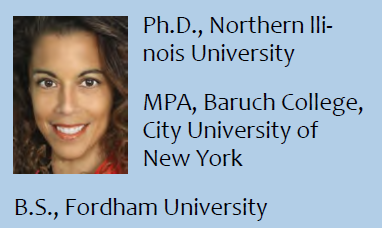
So you want to know what inspires and motivates a professor. To understand Adrienne Holloway, an assistant professor in the
School of Public Service, that’s as easy as ABCD.
That stands for
Asset Based Community Development, among Holloway’s interests. It’s a strategy for community-driven development that relies on a community’s assets, not its
needs, to solve problems. Once you identify those assets, such as people, organizations and institutions within a community, you help put them to work on the community’s needs.
Take Holloway’s first full-time job in public service. Fresh out of New York City’s Fordham University, she became residential services director at
Promesa, a drug and alcohol rehabilitation facility in Bronx, N.Y.
She trained and mentored her staff, and she went into local neighborhoods, where she established relationships with community, business and government leaders. She explained and showed the good that Promesa
was doing. She got acceptance, funding and continued licensing.
The program was well on its way, and so was she.
Today at SPS, Holloway specializes in community development, particularly in communities of color, plus social welfare policy, with a focus on housing. Her interests also include regional policy, poverty studies and nonprofit management.
She said her work at Promesa helped inspire and inform the work she does today.
“I found that the young men who were in my program often were coming from a drug treatment facility,” she said. “It became kind of their way back into mainstream society after being in a residential program. But I also found that young people were finding their way into my program because their parents could no longer afford to care for them.”
She said that moved her to study and understand the diverse needs of a community, to establish programs to meet those needs, to identify what went well and to improve those programs as needs change.
Collaboration and what she calls “small successes” serve as lynchpins throughout her work, interests and teaching.
Consider the successes of a public servant and a community. We agree that alleviation of hunger or homelessness represent big successes. Yet we must acknowledge and celebrate the small successes along the way, Holloway said, because that’s how we maintain momentum and drive to continue the work that we do to achieve the mission and the
vision of community work.
And that’s where her students come in. “The issues that we discuss in class are very multi-faceted, complicated and deep,” Holloway said. “Because of that, it can seem to be overwhelming and impossible to make a change of any significance. What I try to do is reiterate to students that it’s the small successes that keep us focused and motivate
us.”
In community development, she finds small successes through bringing together various factions to develop a plan of action.
“Sometimes communities are not talking to each other,” she said. “We’re putting the past behind us, and we’re going to generate new energy, collaboration. That’s one example. Another is being able to speak highly of a community that others wouldn’t be able to see the beauty in.”
It all comes back to collaboration involving government, for-profit and nonprofit sectors – a School of Public Service emphasis.
“We can’t depend on one sector to address the compilation of issues,” Holloway said. “We need a very diverse set of stakeholders and a multi-tiered level of investment. Government isn’t going to be the most innovative and responsive. The private sector might not have the public will. Nonprofits have that community touch. When we combine them, we’re inviting such a strong team to move an initiative forward.”
Holloway emphasized collaboration and Asset Based Community Development in a recent paper titled “Asset Based Community Development and Community Safety in Communities of Color-Is ABCD a valid methodology to reach community safety goals?"
The paper, which she presented at the 40th annual conference of the
National Council for Black Studies, serves as a highlight of her recent work and university-related activities
and achievements. In recent months, she has been:
• recognized by DePaul’s
Council on Community Engagement as a professor who had significant influence on univer
sity students in their development as engaged learners and
leaders;
across the globe.
At the SPS End of the Year Party in early June, she oversaw the induction of 10 students, including five undergraduate students (please see page 8 of this newsletter), giving the local PAA some 45 new members since 2011-2012.
Such activities underscore why Holloway found herself in academia.
“I was trying to find a space where I could have as much of an impact as I could,” she said. “I’ve worked in community development. I’ve worked with community members. I’ve worked with young people trying to improve their lives. And I’ve worked with communities of color. Being at DePaul has given me an opportunity to do that same work in addition to academic work in the same space.”
“One of the refreshing things about working at DePaul is this dual interest in my work and Vincentian values,” Holloway said. “From a teaching standpoint, if anything it confirms that the work that I do is not disjointed, it’s not disconnected. If I was at a university where Vincentian values weren’t part of the community fabric, it would be challenging for me.”